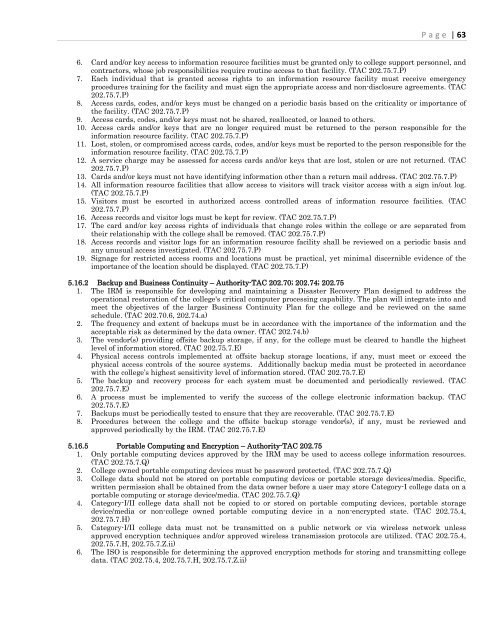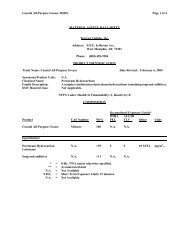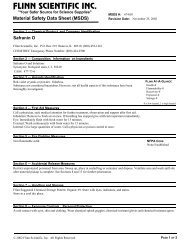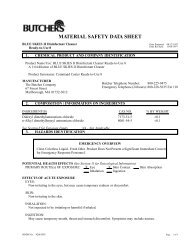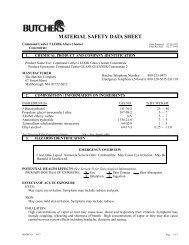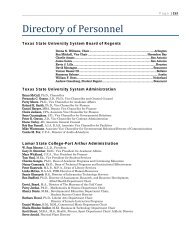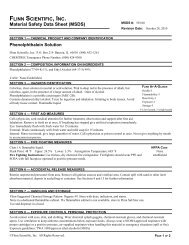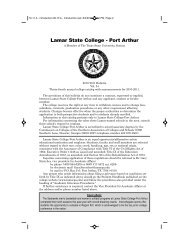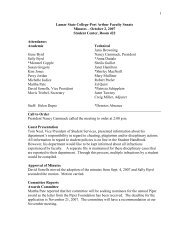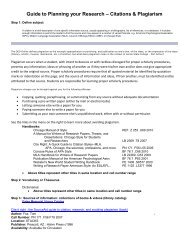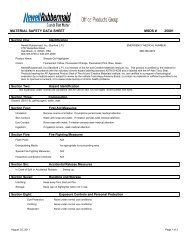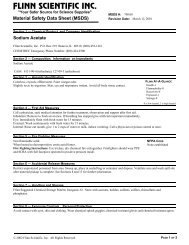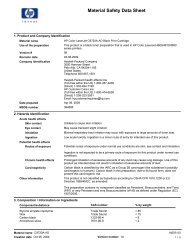Page | 636. Card and/or key access to information resource facilities must be granted only to college support personnel, andcontractors, whose job responsibilities require routine access to that facility. (TAC 202.75.7.P)7. Each individual that is granted access rights to an information resource facility must receive emergencyprocedures training for the facility and must sign the appropriate access and non-disclosure agreements. (TAC202.75.7.P)8. Access cards, codes, and/or keys must be changed on a periodic basis based on the criticality or importance ofthe facility. (TAC 202.75.7.P)9. Access cards, codes, and/or keys must not be shared, reallocated, or loaned to others.10. Access cards and/or keys that are no longer required must be returned to the person responsible for theinformation resource facility. (TAC 202.75.7.P)11. Lost, stolen, or compromised access cards, codes, and/or keys must be reported to the person responsible for theinformation resource facility. (TAC 202.75.7.P)12. A service charge may be assessed for access cards and/or keys that are lost, stolen or are not returned. (TAC202.75.7.P)13. Cards and/or keys must not have identifying information other than a return mail address. (TAC 202.75.7.P)14. All information resource facilities that allow access to visitors will track visitor access with a sign in/out log.(TAC 202.75.7.P)15. Visitors must be escorted in authorized access controlled areas of information resource facilities. (TAC202.75.7.P)16. Access records and visitor logs must be kept for review. (TAC 202.75.7.P)17. The card and/or key access rights of individuals that change roles within the college or are separated fromtheir relationship with the college shall be removed. (TAC 202.75.7.P)18. Access records and visitor logs for an information resource facility shall be reviewed on a periodic basis andany unusual access investigated. (TAC 202.75.7.P)19. Signage for restricted access rooms and locations must be practical, yet minimal discernible evidence of theimportance of the location should be displayed. (TAC 202.75.7.P)5.16.2 Backup and Business Continuity – Authority-TAC 202.70; 202.74; 202.751. The IRM is responsible for developing and maintaining a Disaster Recovery Plan designed to address theoperational restoration of the college's critical computer processing capability. The plan will integrate into andmeet the objectives of the larger Business Continuity Plan for the college and be reviewed on the sameschedule. (TAC 202.70.6, 202.74.a)2. The frequency and extent of backups must be in accordance with the importance of the information and theacceptable risk as determined by the data owner. (TAC 202.74.b)3. The vendor(s) providing offsite backup storage, if any, for the college must be cleared to handle the highestlevel of information stored. (TAC 202.75.7.E)4. Physical access controls implemented at offsite backup storage locations, if any, must meet or exceed thephysical access controls of the source systems. Additionally backup media must be protected in accordancewith the college’s highest sensitivity level of information stored. (TAC 202.75.7.E)5. The backup and recovery process for each system must be documented and periodically reviewed. (TAC202.75.7.E)6. A process must be implemented to verify the success of the college electronic information backup. (TAC202.75.7.E)7. Backups must be periodically tested to ensure that they are recoverable. (TAC 202.75.7.E)8. Procedures between the college and the offsite backup storage vendor(s), if any, must be reviewed andapproved periodically by the IRM. (TAC 202.75.7.E)5.16.5 <strong>Port</strong>able Computing and Encryption – Authority-TAC 202.751. Only portable computing devices approved by the IRM may be used to access college information resources.(TAC 202.75.7.Q)2. <strong>College</strong> owned portable computing devices must be password protected. (TAC 202.75.7.Q)3. <strong>College</strong> data should not be stored on portable computing devices or portable storage devices/media. Specific,written permission shall be obtained from the data owner before a user may store Category-I college data on aportable computing or storage device/media. (TAC 202.75.7.Q)4. Category-I/II college data shall not be copied to or stored on portable computing devices, portable storagedevice/media or non-college owned portable computing device in a non-encrypted state. (TAC 202.75.4,202.75.7.H)5. Category-I/II college data must not be transmitted on a public network or via wireless network unlessapproved encryption techniques and/or approved wireless transmission protocols are utilized. (TAC 202.75.4,202.75.7.H, 202.75.7.Z.ii)6. The ISO is responsible for determining the approved encryption methods for storing and transmitting collegedata. (TAC 202.75.4, 202.75.7.H, 202.75.7.Z.ii)
Page | 647. Unattended portable computing devices must be physically secure. This means they must be locked in anoffice, locked in a desk drawer or filing cabinet, or locked in a secure, out-of-sight area of a vehicle. (TAC202.75.7.Q)5.16.6 System Development and Auditing – Authority-TAC 202.71; 202.751. The Information Technology Services Department is responsible for developing, maintaining, and participatingin a System Development Life Cycle (SDLC) for college system development projects. All software developedin-house which runs on production systems must be developed according to the SDLC. At a minimum, this planshould address the areas of preliminary analysis or feasibility study; security implications; risk identificationand mitigation; systems analysis; general design; detail design; development; quality assurance and acceptancetesting; implementation; and post-implementation maintenance and review. This methodology ensures thatthe software will be adequately documented and tested before it is used for critical college information. (TAC202.75.6.B, 202.75.7.D, 202.75.7.U, 202.75.7.W)2. All production systems must have designated owners and custodians. (TAC 202.71.c)3. All production systems must have an access control system suited to the classification of data stored on thesystem as determined by the risk analysis process. (TAC 202.75.3.C)4. Where resources permit, there shall be a separation between the production, development, and testenvironments. All development and testing environments must utilize sanitized data or maintain the samesecurity access as the production system. (TAC 202.75.6.A)5. All application-program-based access paths other than the formal user access paths must be deleted ordisabled before software is moved into production. (TAC 202.75.7.D)6. Information resources systems shall provide the means whereby authorized personnel have the ability to auditand establish individual accountability for any action that can potentially cause access to, generation of,modification of, or affect the release of Category-I data. (TAC 202.75.5.A)7. Appropriate audit trails shall be maintained to provide accountability for updates to Category-I data andrelated hardware and software, and for all changes to automated security or access rules. (TAC 202.75.5.B)8. Based on the risk assessment completed by the ISO, a sufficiently complete history of transactions shall bemaintained to permit an audit of the information resources system by logging and tracing the activities ofindividuals through the system. (TAC 202.75.5.C)9. Where possible a logon banner/warning should be presented when a user logs on to a system. The ISO shallapprove the content of the banner/warning. (TAC 202.75.9)5.16.7 Acceptable Use – Authority – TAC 202.70; 202.751. <strong>Lamar</strong> <strong>State</strong> <strong>College</strong> – <strong>Port</strong> <strong>Arthur</strong> information resources are finite by nature. All users must recognize thatcertain uses of college owned information technology resources may be limited or regulated as required tofulfill the college’s primary teaching, research and public service missions.2. Users must report any weaknesses in computer security, any incidents of possible misuse or violation of thisagreement to the Information Security Officer. (TAC 202.75.7.A)3. Users must not attempt to access any data or programs contained on college systems for which they do nothave authorization or explicit consent to do so. (TAC 202.75.7.A)4. Users must not share their college account(s), passwords, Personal Identification Numbers (PIN), SecurityTokens (i.e. Smartcard), or similar information or devices used for identification and authorization purposes.(TAC 202.75.7.A)6. Users are responsible for all actions that take place with their account. (TAC 202.70.3)7. Users must distinguish between ideas, comments, and opinions of the individual user versus those thatrepresent the official positions, programs, and activities of the college.8. The college is not responsible for the content of documents, exchanges or messages, including links to otherinformation locations on the internet or world wide web, that reflect only the personal ideas, comments andopinions of individual members of the college community, even where they are published or otherwisecirculated to the public at large by means of college information technology resources.9. Students, faculty and staff using information technology resources for purposes of exchanging, publishing orcirculating official institutional documents must follow LSC-PA requirements concerning appropriate content,style and use of logos, seals, or other official insignia.10. Users of college information resources must not use any software not provided by the college withoutInformation Technology Services Department approval. (TAC 202.75.7.V)11. Users must not purposely engage in activity that may: harass, threaten or abuse others; degrade theperformance of college information resources; deprive an authorized <strong>Lamar</strong> <strong>State</strong> <strong>College</strong> - <strong>Port</strong> <strong>Arthur</strong> useraccess to a college resource; obtain extra resources beyond those allocated; circumvent any computer securitymeasures. (TAC 202.75.7.A)12. Users must not download, install or run security programs or utilities that reveal or exploit weaknesses in thesecurity of a system. For example, users must not run password cracking programs, packet sniffers, or portscanners or any other non-approved programs on college information resources. (TAC 202.75.7.V)13. <strong>Lamar</strong> <strong>State</strong> <strong>College</strong> - <strong>Port</strong> <strong>Arthur</strong> information resources must not be used for personal benefit, politicallobbying or campaigning. (TAC 202.75.7.A)


